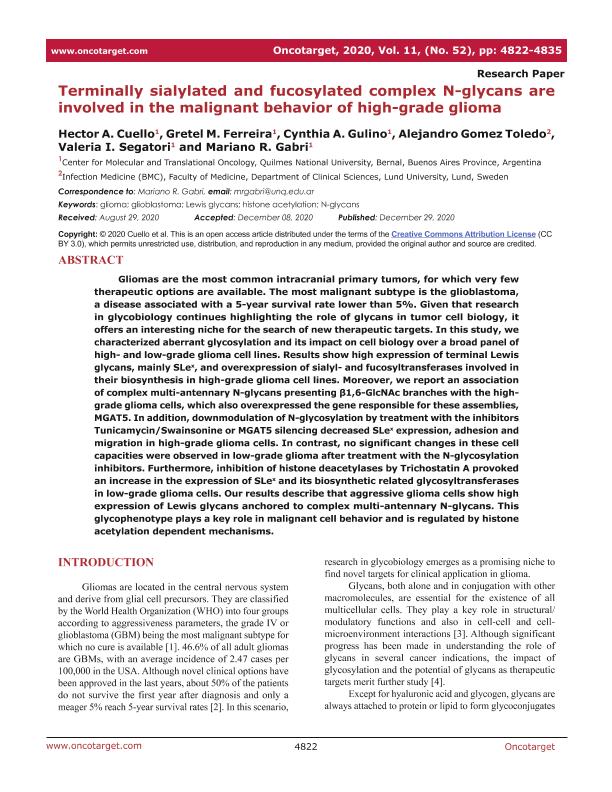Artículo
Terminally sialylated and fucosylated complex N-glycans are involved in the malignant behavior of high-grade glioma
Cuello, Héctor Adrián ; Ferreira, Gretel Magalí
; Ferreira, Gretel Magalí ; Gulino, Cynthia Antonella; Gomez Toledo, Alejandro; Segatori, Valeria Inés
; Gulino, Cynthia Antonella; Gomez Toledo, Alejandro; Segatori, Valeria Inés ; Gabri, Mariano Rolando
; Gabri, Mariano Rolando
 ; Ferreira, Gretel Magalí
; Ferreira, Gretel Magalí ; Gulino, Cynthia Antonella; Gomez Toledo, Alejandro; Segatori, Valeria Inés
; Gulino, Cynthia Antonella; Gomez Toledo, Alejandro; Segatori, Valeria Inés ; Gabri, Mariano Rolando
; Gabri, Mariano Rolando
Fecha de publicación:
12/2020
Editorial:
Impact Journals
Revista:
Oncotarget
e-ISSN:
1949-2553
Idioma:
Inglés
Tipo de recurso:
Artículo publicado
Clasificación temática:
Resumen
Gliomas are the most common intracranial primary tumors, for which very few therapeutic options are available. The most malignant subtype is the glioblastoma, a disease associated with a 5-year survival rate lower than 5%. Given that research in glycobiology continues highlighting the role of glycans in tumor cell biology, it offers an interesting niche for the search of new therapeutic targets. In this study, we characterized aberrant glycosylation and its impact on cell biology over a broad panel of high- and low-grade glioma cell lines. Results show high expression of terminal Lewis glycans, mainly SLex, and overexpression of sialyl- and fucosyltransferases involved in their biosynthesis in high-grade glioma cell lines. Moreover, we report an association of complex multi-antennary N-glycans presenting β1,6-GlcNAc branches with the high-grade glioma cells, which also overexpressed the gene responsible for these assemblies, MGAT5. In addition, downmodulation of N-glycosylation by treatment with the inhibitors Tunicamycin/Swainsonine or MGAT5 silencing decreased SLex expression, adhesion and migration in high-grade glioma cells. In contrast, no significant changes in these cell capacities were observed in low-grade glioma after treatment with the N-glycosylation inhibitors. Furthermore, inhibition of histone deacetylases by Trichostatin A provoked an increase in the expression of SLex and its biosynthetic related glycosyltransferases in low-grade glioma cells. Our results describe that aggressive glioma cells show high expression of Lewis glycans anchored to complex multi-antennary N-glycans. This glycophenotype plays a key role in malignant cell behavior and is regulated by histone acetylation dependent mechanisms.
Palabras clave:
GLIOBLASTOMA
,
GLIOMA
,
HISTONE ACETYLATION
,
LEWIS GLYCANS
,
N-GLYCANS
Archivos asociados
Licencia
Identificadores
Colecciones
Articulos(SEDE CENTRAL)
Articulos de SEDE CENTRAL
Articulos de SEDE CENTRAL
Citación
Cuello, Héctor Adrián; Ferreira, Gretel Magalí; Gulino, Cynthia Antonella; Gomez Toledo, Alejandro; Segatori, Valeria Inés; et al.; Terminally sialylated and fucosylated complex N-glycans are involved in the malignant behavior of high-grade glioma; Impact Journals; Oncotarget; 11; 52; 12-2020; 4822-4835
Compartir
Altmétricas



